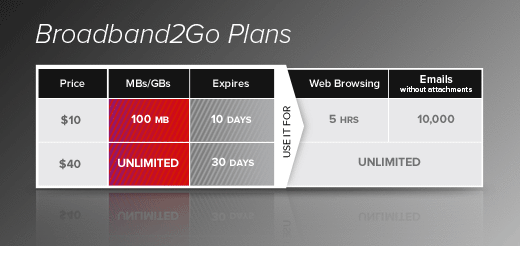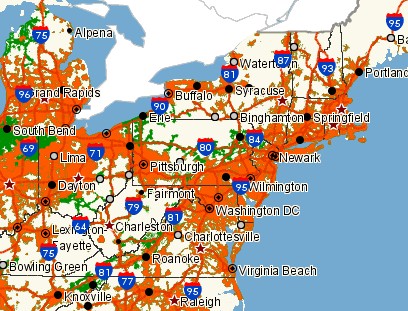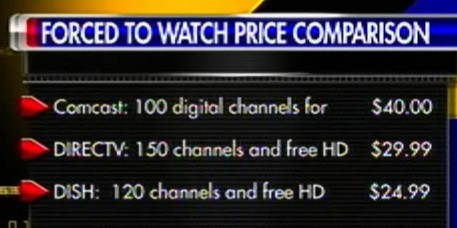 Virgin Mobile, Sprint’s prepaid wireless division, will introduce big changes to their mobile broadband pricing as early as tomorrow, including an unlimited mobile broadband plan for $40 a month.
Virgin Mobile, Sprint’s prepaid wireless division, will introduce big changes to their mobile broadband pricing as early as tomorrow, including an unlimited mobile broadband plan for $40 a month.
While the fine print is not yet available for review, if Sprint defines “unlimited” the way dictionaries do, the introduction of unlimited access for $40 a month represents a major departure among carriers who are increasing mobile data pricing or slapping usage limits or speed throttles on customers.
Virgin Mobile noted some of their customers are replacing their home wired broadband connections with the company’s own wireless broadband option, and the new unlimited pricing plan makes that a realistic option for some consumers who can live with Sprint’s current 3G network speeds. Virgin Mobile customers currently do not have access to Sprint’s Clearwire 4G network.
Virgin Mobile’s new Broadband2Go price plans were leaked on their Facebook page over the weekend:

Virgin Mobile's Broadband2Go Plans have been simplified into one occasional use budget plan and unlimited service for $40 a month
The new pricing departs from old pricing models that included four tiers of service, none unlimited, sold by anticipated data usage:

Virgin Mobile's old Broadband2Go delivered usage limits and forced consumers to guess at how much of a usage allowance they would need.
Virgin Mobile’s new flat rate mobile broadband data plan reflects increasingly aggressive pricing in the prepaid wireless business. While other carriers place limits of up to 5GB on usage — typically sold for $60 a month, Virgin Mobile’s plan is fully $20 less per month and offers unlimited access.
The service is sold on a month-to-month basis with no contract requirement or credit check. If the service does not meet one’s needs, customers can just walk away at the end of the month.
Virgin Mobile uses Sprint’s CDMA network, which offers reasonable coverage in metropolitan areas but is much spottier outside of population centers.

In the northeastern United States, Sprint's data network extends to large communities and major highways, but routinely skips smaller towns and isolated areas. For example, Virgin Mobile offers almost no service in northern New England. In upstate New York, service becomes spotty beyond the cities of Albany, Syracuse, Rochester, Buffalo, and the highways that connect them. There's almost no coverage in northern Pennsylvania, West Virginia, or eastern Kentucky either.
Virgin Mobile, formerly a reseller of Sprint’s network but now owned outright by them, has repositioned itself to emphasize “worry-free, unlimited service” for consumers who do not want to count calls, minutes, or megabytes. Their latest marketing campaign pushes “crazy” low pricing, while calling out larger carriers charging up to $99 a month for the same service as “stupid.”
Virgin Mobile’s new pricing is expected to become effective Tuesday and will create a shakeup in the prepaid mobile broadband sector. Perhaps no carrier is at bigger risk of losing mobile data customers than Cricket Wireless, which recently increased pricing on its mobile broadband service delivered on a far smaller network.
Virgin Mobile’s new pricing represents a far good deal for consumers and dispenses with usage limits. The only downside is that Virgin Mobile customers will have to buy new modems — an Ovation MC760 for $79.99 or the MiFi 2200 Mobile Hotspot, which lets up to five users share a Virgin Mobile 3G connection over Wi-Fi, for $149.99. These are available on Virgin Mobile’s website or in Best Buy stores.
[flv width=”640″ height=”500″]http://www.phillipdampier.com/video/The Crazy Life by Virgin Mobile – Full Version.flv[/flv]
Virgin Mobile’s “The Crazy Life” campaign is certain to be noticed amidst other, more subdued, advertising. It promotes Virgin Mobile’s embrace of unlimited calling and data plans. (1 minute)
 Verizon Wireless today announced a new 5GB tier for its prepaid mobile broadband service at a steep price — $80 per month.
Verizon Wireless today announced a new 5GB tier for its prepaid mobile broadband service at a steep price — $80 per month.

 Subscribe
Subscribe









